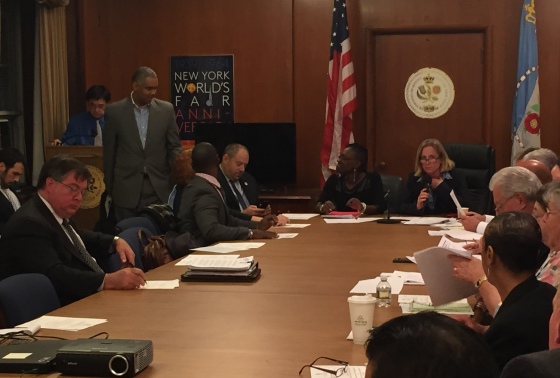
Queens BP Melinda Katz (center)
Dec. 1, 2015 By Jackie Strawbridge
Queens Borough President Melinda Katz has joined growing opposition to the City’s two major zoning proposals.
Katz announced Tuesday that she opposes the Department of City Planning’s proposed “Zoning for Quality and Affordability” and “Mandatory Inclusionary Housing” zoning text amendments.
ZQA involves a slew of modifications to current zoning regulations that DCP believes will promote affordable housing and higher quality buildings. MIH would require that new developments of 10 units or more include 25 or 30 percent permanently affordable housing when built in an area that is rezoned to increase housing capacity.
Each are significant components of Mayor Bill de Blasio’s effort to create 200,000 units of affordable housing Citywide in the next 10 years.
One issue Katz raised with ZQA, which has been controversial throughout western Queens, was DCP’s proposal to eliminate parking requirements at new affordable housing and affordable senior housing developments in certain areas served by public transit.
“In the borough of families, we must ensure that working families are able to get to their jobs, and that elders are able to lead dignified, productive and active lives,” she said in a statement. “We need to continue to allow for access to parking for all constituencies.”
She also noted that dozens of Queens neighborhoods were rezoned over roughly the last decade, and worried that ZQA would undo some of the decisions made through the rezonings, specifically those geared at preventing overdevelopment.
Regarding MIH, Katz took issue with the City’s definition of “affordable,” charging that proposed income limits might be out of reach for many Queens neighborhoods. She also charged that MIH does not make sufficient commitments to skilled labor in affordable housing construction.
She raised a litany of other concerns, including potentially impermanent affordable senior housing and dissatisfaction with alternative options for developers to creating affordable housing.
Last month, the leaders of Queens’ 14 community boards overwhelmingly rejected the ZQA and MIH proposals. They similarly cited the parking issue and already overburdened infrastructure.
“While it is exciting, it is frightening because there are no schools, there is insufficient transportation and no medical facilities and none of these things are funded for in the budget or planned to occur any time soon,” CB 2 Chairman Pat O’Brien said at the time.
Announcing her disapproval today, Katz said, “this is not about whether one is for or against affordable housing.”
“Everyone shares the goals and recognizes the need to aggressively expand affordable housing stock to meet the ever-growing demand,” she continued. “When we do, however, it must be done right. The breadth of neighborhoods in a city like New York requires far more nuanced and strategically planned rezonings instead of a wholesale ‘one size fits all’ approach”
Both Bronx Borough President Ruben Diaz Jr. and Manhattan Borough President Gale Brewer have also voiced opposition to the zoning amendments.
The zoning amendments will ultimately be voted on by the City Council.
3 Comments







Glad there is someone intelligent representing Queens. How much longer til de bozio is out of office?
it’s NOT affordable housing if you make UNDER $90k/yr and your rent is $1700/mo WTF
Thank god. Hope it doesn’t pass at the City Council.